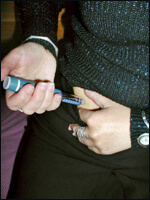Diabetes
 Diabetes is a disease caused by insufficient pancreas secretion of the insulin hormone responsible for the regulation of glucose( sugar) in the blood. This disease is characterized by a violation of carbohydrate metabolism with an increase in glucose in the urine and blood, as well as other metabolic disorders. To date, according to statistics, this disease on our planet affects about one hundred and fifty million people.
Diabetes is a disease caused by insufficient pancreas secretion of the insulin hormone responsible for the regulation of glucose( sugar) in the blood. This disease is characterized by a violation of carbohydrate metabolism with an increase in glucose in the urine and blood, as well as other metabolic disorders. To date, according to statistics, this disease on our planet affects about one hundred and fifty million people.
Diabetes mellitus distinguishes two main types: insulin-dependent( type 1 diabetes) and insulin-independent( type 2 diabetes).In this article we will consider the first type.
In most cases, insulin-dependent diabetes develops in people under the age of forty, while the person must constantly inject insulin. The main cause of the development of type 1 diabetes is the death of beta cells responsible for the synthesis of insulin, as a result of which the production of this hormone either completely ceases, or significantly decreases. This happens under the influence of various factors: viral infections, autoimmune process, etc.
After the virus enters the human body and is detected by the immune system, antibodies are beginning to be produced that destroy the virus. However, due to the individual characteristics of the immune system, the synthesis of antibodies does not stop even after the destruction of foreign agents and they begin to attack the cells of their own organism while destroying the beta cells of the pancreas
. Causes of diabetes
The main predisposing factor of this disease is heredity. The risk of diabetes is very high, if a person in one of his close relatives( mother, father, sister, brother) suffers from this disease. According to statistics, the probability of inheritance along the line of the father is 10%, and on the line of the mother - about 7%.In case this disease is present in both parents, the likelihood of diabetes is increased to 70%.
Also one of the predisposing factors is obesity, so throughout life you need to closely monitor your weight. Also, the death of beta cells is possible due to damage to the pancreas as a result of the effects of certain diseases( pancreatic cancer, pancreatitis, diseases of the endocrine glands).In this case, a stupid trauma of the abdominal cavity can become a provoking factor.
In addition, viral infections can lead to the death of cells synthesizing insulin: epidemic hepatitis, chicken pox, influenza , rubella, etc. These infections act as triggers triggering the development of diabetes. In a completely healthy person, these diseases can not cause a development of diabetes, but in combination with such factors as obesity and heredity, it is likely.
Chronic stress, taking certain medications, and various hormonal disorders, long-term alcohol abuse and the natural aging process of the body and increase the risk of developing diabetes
Diabetes
symptoms The main signs of the presence in the diabetes man are:
- despite the presence of the constant feeling of hunger, There is rapid weight loss
- Feelings of thirst and frequent urination
- Feeling of general weaknessAnd or fatigue
- Numbness and subsequent tingling in numb limbs
- Blurred vision, so-called "white shroud" before the eyes
- Violation of sexual activity
- Feeling of heaviness in the legs
- Slow healing of infectious diseases
- Dizziness
- Itching in the perineumAnd skin itching
- Body temperature drop below normal
- Cramping of the calf muscles and fatigue
- Slow wound healing
- Pain sensations in the heart area
- Furnkulez
Diagnostics
Diagnosis of diabetes mellitus is established on the basis of such diagnostic signs as: elevated fasting blood glucose level, the appearance of sugar in the urine, increased consumption and, respectively, urine fluid excretion, weight loss, urinary excretion of ketone bodies
Treatment of diabetes mellitus
For treatment useinsulin, oral hypoglycemic drugs, diet therapy and exercise therapy. The main goal of therapeutic measures is to restore normal body weight and normalize disturbed metabolic processes;restoration / preservation of work capacity, as well as treatment / prevention of vascular complications.
Artificially synthesized insulin( protein hormone) is very widely used for the treatment of diabetes mellitus( insulin-dependent).It can be injected solely by injection, since in case of getting into the stomach, it collapses and thus can not realize its direct biological purpose. This drug is released in a special syringe-tube, so that the patient can easily make a prick when he feels that he needs it. In most cases, at the very beginning of the disease, the body still has cells producing insulin, but their number is very small and does not meet the necessary needs of the body. After insulin begins to come from outside, the additional load from these cells is removed and they begin to synthesize a larger amount of insulin after a certain period of time. During this period, the dose of insulin administered may decrease. This process occurs in patients in the first year of the course of the disease and unfortunately lasts only for a short time. After its completion, the insulin dose again increases
Diabetes with diabetes mellitus
With all clinical forms of diabetes, sticking to a certain diet is a vital necessity.
The main principles of dietotherapy include: strictly individual selection of daily calories, the complete elimination of easily assimilated carbohydrates;strictly calculated content of physiological quantities of fats, proteins, vitamins and carbohydrates;fractional food with evenly distributed carbohydrates and calories. In the diet used in diabetes, the ratio of carbohydrates, fats and proteins in  consumed food should be maximally close to the physiological: 50-60% of the total number of calories should account for carbohydrates, 25-30% for fats and 15-20%on proteins. Also, the diet should contain for one kilogram of body weight at least 4 - 4.5 grams of carbohydrates, 1 - 1.5 grams of protein and 0.75 - 1.5 grams of fat in a daily dosage.
consumed food should be maximally close to the physiological: 50-60% of the total number of calories should account for carbohydrates, 25-30% for fats and 15-20%on proteins. Also, the diet should contain for one kilogram of body weight at least 4 - 4.5 grams of carbohydrates, 1 - 1.5 grams of protein and 0.75 - 1.5 grams of fat in a daily dosage.
The main rule of the diet for diabetes is the complete elimination or significant restriction of eating refined carbohydrates, while their total should be about 125 grams per day( to prevent ketoacidosis).



